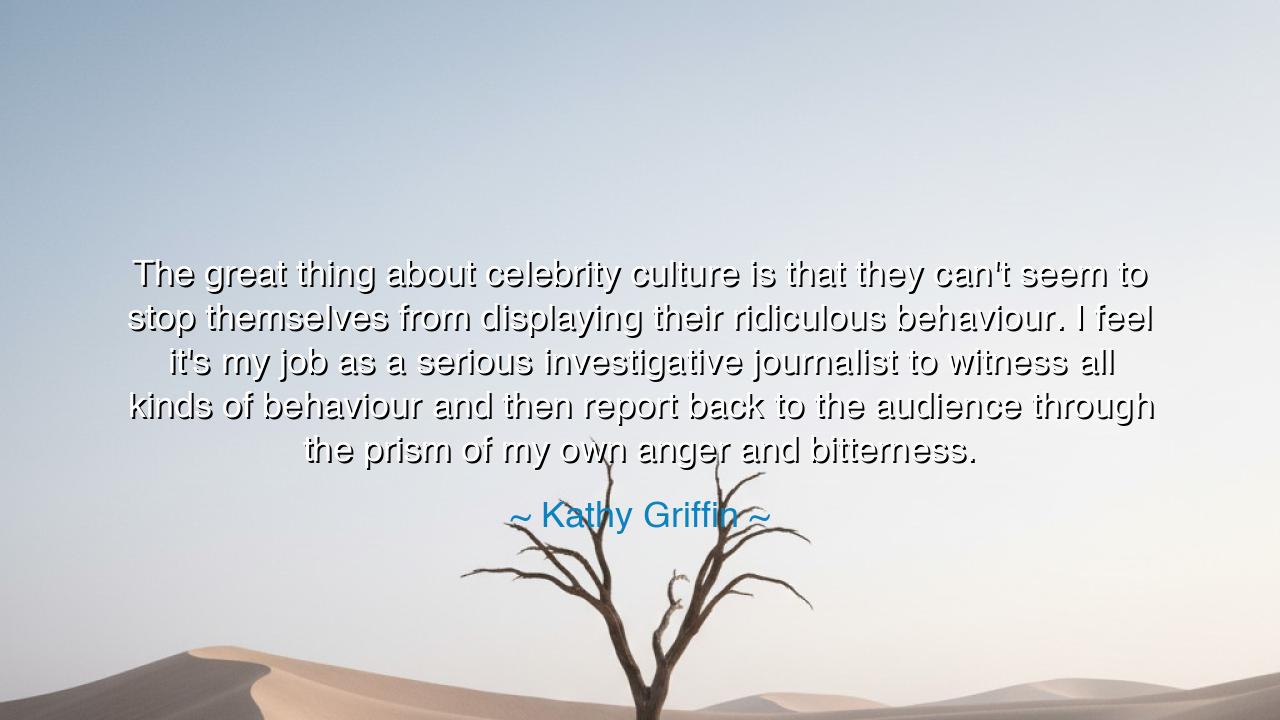
The great thing about celebrity culture is that they can't seem
The great thing about celebrity culture is that they can't seem to stop themselves from displaying their ridiculous behaviour. I feel it's my job as a serious investigative journalist to witness all kinds of behaviour and then report back to the audience through the prism of my own anger and bitterness.






Host: The evening was quiet, the soft glow of the lamp casting gentle shadows across the room. The world outside had quieted, and inside, there was a calm sense of anticipation, as though a thought was waiting to be shared. Jeeny sat at the table, a book resting in her hands, but her mind seemed elsewhere. Jack, standing by the window, looked out at the darkening sky, lost in thought. The atmosphere between them was still, but filled with the sense that the conversation was about to take a deeper turn.
Finally, Jeeny spoke, her voice thoughtful yet carrying an edge of curiosity.
Jeeny: “I came across something today by Kathy Griffin that really made me think. She said, ‘The great thing about celebrity culture is that they can’t seem to stop themselves from displaying their ridiculous behaviour. I feel it’s my job as a serious investigative journalist to witness all kinds of behaviour and then report back to the audience through the prism of my own anger and bitterness.’ What do you think about that?”
Jack: (pauses, his voice thoughtful) “It’s a pretty bold statement, isn’t it? She’s acknowledging the ridiculousness of celebrity culture, but also owning the fact that her job is to reflect that absurdity back to the audience, using her own personal emotions—anger and bitterness—as the lens. It’s almost like she’s saying, ‘I see your behavior, and I’m going to call it out, even if it’s uncomfortable for me.’”
Jeeny: (nodding slowly) “Exactly. She’s positioning herself as a witness, someone who isn’t just reporting on celebrity culture but is actively engaging with it, commenting on it from her own perspective. It’s like she’s saying, ‘You want to be seen in all your flaws and missteps, and I’m going to amplify that through my own reaction.’ It’s a way of using the ridiculousness of it all as a kind of commentary.”
Host: The stillness between them deepened, as the weight of Jeeny’s words settled in the air. The quiet of the room seemed to mirror the reflection of the celebrity culture they were discussing, with Jack now considering the deeper implications of Griffin’s statement.
Jack: (softly) “I think there’s something interesting about how she describes her role as an investigative journalist. She’s not just neutral or detached; she’s involved. Her personal feelings, her anger, her bitterness are integral to her perspective. It makes the whole process more personal, more real. But at the same time, it’s dangerous. When you report through anger, are you still telling the truth, or just reinforcing your own emotions?”
Jeeny: (with a gentle smile) “That’s the tension, isn’t it? On one hand, she’s using her own feelings to bring authenticity and rawness to the reporting. But on the other, that lens of anger and bitterness can skew the truth. It’s about whether or not you can separate your personal bias from the story you’re telling.”
Jack: (nodding slowly) “It’s like when you watch reality TV—you know it’s ridiculous, you know it’s exaggerated, but you can’t look away. Griffin is saying, ‘I’m not just watching, I’m actively engaging with it.’ She’s making it personal, using her disdain as part of the narrative, which in a way makes it even more compelling because you can feel the emotion in it.”
Jeeny: (smiling faintly) “Yes, it’s almost like she’s giving a voice to the audience's frustration. People often watch celebrity culture with a sense of disbelief or disgust, and she’s reflecting that back to them, validating their feelings. By doing so, she becomes the bridge between the spectacle and the audience, with her personal anger acting as a form of catharsis.”
Host: The conversation seemed to grow more introspective, the weight of their words hanging between them. Outside, the night had settled in, but inside, the conversation felt full of a deeper understanding. The celebrity culture they were discussing had revealed something about the relationship between media, emotion, and truth. Jeeny and Jack sat in the realization that while reporting on celebrity culture might seem frivolous, it was, in fact, a reflection of something larger—our collective reaction to the absurdity and excess of fame, and how we process that through our own emotions.
Jack: (with a faint smile) “I guess that’s the difference between just being a reporter and being a commentator—Griffin isn’t just telling the story. She’s making it her own, adding her personal perspective to it. It’s not just about what’s happening; it’s about how she feels about it.”
Jeeny: (nodding) “Exactly. And in that, there’s a kind of honesty. She’s not pretending to be neutral; she’s embracing her role as someone who feels deeply about the subject. It’s a reminder that, in the world of celebrity culture, the emotions of the audience—and the reporter—are just as important as the spectacle itself.”
Host: The stillness in the room seemed to shift, as if a layer of understanding had settled between them. The world outside continued to sleep, but inside, Jeeny and Jack had uncovered something larger about how we engage with media, with celebrity culture, and with our own emotional reactions to the spectacle. In the end, it wasn’t just about watching; it was about how we react to it and how those reactions shape the stories we tell.






AAdministratorAdministrator
Welcome, honored guests. Please leave a comment, we will respond soon